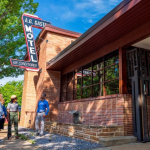Alabama News Center Staff
As Birmingham continues to celebrate the 60th anniversary of the civil rights campaign that led to the dismantling of the city’s legal system of racial segregation, another movement is underway: to rename a downtown street for one of the city’s most famous entrepreneurs and civil rights figures.
The Birmingham nonprofit redevelopment organization Urban Impact is leading the effort to rename Fifth Avenue North, between 14th and 24th Streets, in honor of celebrated Black entrepreneur A.G. Gaston, with support from the Gaston family.
“Dr. Gaston established a legacy that paved the way for today’s entrepreneurial development and success, not only in the Fourth Avenue and Civil Rights districts, but throughout the city of Birmingham, the state of Alabama and this nation,” the online petition drive states.
“We want to ensure that Dr. Gaston’s impactful work and the foundation he built for future generations are never forgotten. This is our opportunity to give him the recognition he so rightly deserves,” said Renae Bennett, district development coordinator at Urban Impact.
Arthur George (A.G.) Gaston was born in 1892 in Demopolis, but made his mark in Birmingham. After his father died, he and his mother moved in 1905 to the Magic City where she was employed by the Loveman family, who owned one of the city’s largest department stores.
After serving overseas during World War I, Gaston returned to Birmingham and worked in several jobs before founding his first business, the Booker T. Washington Burial Society.
He later established the Booker T. Washington Insurance Company to serve the city’s Black citizens, who were routinely denied insurance from white-owned companies.
Gaston’s business ventures continued to expand, and ultimately included a funeral home, a business college, a savings and loan, a public relations firm, a construction company, real estate and radio stations. He also built the A.G. Gaston Motel, considered the finest Blacks-only accommodation in segregated Birmingham. The motel, where civil rights leaders planned the strategy for the 1963 campaign to topple the city’s Jim Crow laws, is now being restored as part of the Birmingham Civil Rights National Monument.
Although not an outspoken civil rights leader, according to the Encyclopedia of Alabama, Gaston worked for years behind the scenes in support of equal rights. In 1956, for example, he provided a job to Autherine Lucy to support her financially as she attempted to become the first Black person to attend the University of Alabama.
Despite his more understated approach, Gaston couldn’t avoid becoming a victim of violence as perpetrated by white supremacists in the city. In spring 1963, the Gaston Motel was bombed in an unsuccessful attempt to murder the Rev. Martin Luther King Jr., a leading figure in that year’s desegregation campaign. Then, in September 1963, Gaston’s home was bombed; he was not injured and the home suffered only minimal damage.
Considered one of the most important Black businessmen in Alabama, Gaston went on to write an autobiography and received numerous honors before he died in 1996 at the age of 103. The annual A.G. Gaston Conference for diverse entrepreneurs and business leaders, held in Birmingham, continues Gaston’s legacy.
In an email promoting the petition drive, Bennett said Gaston’s “unwavering commitment to progress deserves to be recognized.”
Several other Birmingham streets have been renamed to honor civil rights and other Black leaders, including the Revs. Fred Shuttlesworth and Abraham Woods, and the city’s first Black mayor, Richard Arrington.
“Together we can inspire our community, honor a remarkable legacy, and create a lasting symbol of Dr. A.G. Gaston’s influence on our city and its people,” Bennett said about the petition drive.
For more information about the petition drive, click here.











